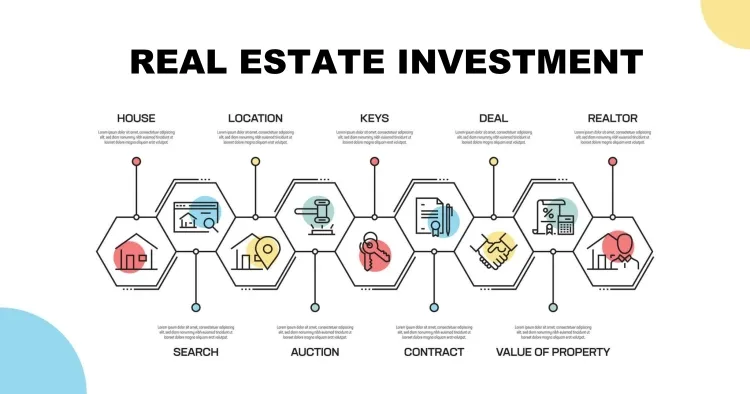Lucrative Side Hustles in Real Estate Investing to Generate Passive Income
Real estate investing has many lucrative side hustles that can generate passive income. Explore options like real estate crowdfunding, buy and hold real estate, real estate partnerships, real estate wholesaling, real estate consulting, and real estate education. These side hustles in real estate can help you diversify your income streams and create wealth in the long run.

Table of Content
Real estate investing has long been a proven path to generating wealth and passive income. While buying and selling property or house flipping can be highly lucrative, there are other side hustles in the real estate sector that can generate ongoing income streams with less hands-on work required. From becoming a real estate referral partner to investing in real estate investment trusts, here are some side hustles in real estate investing to generate passive income.
1. House Flipping
House flipping has become popular in recent years as a way to generate income through real estate investing. The concept is simple: buy a house, fix it up, and resell it quickly for a profit. More details on the process of house flipping and how to get started are described below.
1.1 Finding the Right Property
To be successful at house flipping, you need to find properties with potential that you can purchase at a discount. Look for "fixer-uppers" - properties that need repairs or updates to become attractive to buyers. Search sites like Zillow, Trulia, and Craigslist for listings in your target neighborhoods. Look for clues like "needs TLC", "handyman special", or "priced to sell". Try to determine the after-repair value to ensure there is enough room for profit. Make offers on multiple properties, especially those that have been on the market for a while.
With the right property in hand, you can begin the work of renovation and resale, poised to make a tidy profit from your house flipping venture. But it all starts with finding a suitable home at the right price. With some diligent searching and smart negotiating, you'll find a property ripe with potential to flip for a profit.
1.2 Financing the Deal
Unless you have enough cash on hand to purchase the property outright, you will need financing to fund your house flip.
Consider both short-term loans like hard money loans and long-term mortgages. Hard money loans typically charge higher interest rates but have less stringent lending requirements. They are designed specifically for flippers and rehabbers. You will need a good amount of equity in the deal to qualify.
Long-term mortgages often have lower rates but stricter requirements. However, some lenders offer rehab mortgages specifically geared toward flippers that allow you to finance both the purchase and rehab costs. Compare multiple options to find one suited to your particular deal. Be prepared to put at least 20% down for most loans. With financing in place, you can move ahead confidently with the property purchase and renovation.
1.3 Property Rehab and Repair
Once you have purchased the property, it’s time to dive into renovations. Develop a detailed work scope and contractor bids for all work that needs to be done. Include both large and small repairs, cosmetic upgrades, and any additions that can increase the after-repair value. A good rule of thumb is that rehab costs should not exceed 70% of the expected resale price.
Oversee contractors carefully to ensure work is completed on time and according to the agreed-upon scope. Visit the property frequently to check on progress and make any necessary adjustments to the work scope. Keep a close eye on the budget to avoid going substantially over your cost estimates. It can help to add a 10-20% buffer to your budget ahead of time for any unforeseen repairs. With the right repairs and renovations complete, you'll have a house ready to sell at a healthy profit.

2. Rental Property Investing
Rental property investing can be an attractive way to generate long-term income and build wealth. By purchasing residential or commercial real estate and renting it out to tenants, investors can earn ongoing rental income each month. Over time, the property may also appreciate in value, allowing investors to build equity. As we'll explore in more detail below, rental property investing does come with risks and downsides to be aware of
2.1 Finding the Right Property
The first step to successful rental property investing is finding the right property that will attract long-term tenants. Look for properties in safe neighborhoods with low vacancy rates and limited new construction. Properties near schools, public transit, and employers are often good options. Consider both multi-family properties as well as single-family homes. Ensure any property you consider purchasing will generate a positive cash flow once expenses like taxes, insurance, maintenance, and property management fees are accounted for.
2.2 Calculating Potential Returns
Evaluate potential rental income of any property based on the local market rates for similar properties. Then determine your potential annual expenses for the property including taxes, insurance, maintenance, and property management. Subtract your total annual expenses from the potential rental income to determine your potential annual cash flow. Factor in additional returns like rental income growth over time and property value appreciation. Compare your potential returns to other investment vehicles to ensure rental property investing will meet your financial goals.

2.3 Obtaining Financing
Most real estate investors finance rental property purchases with a mortgage. Work with a lender that offers investment property mortgages to obtain financing. Be prepared to provide details on the property, your investment strategy, and financial documents to verify your income, debt levels, and credit score. Loan terms typically range from 15 to 30 years for rental properties. Make a minimum 20% downpayment to get the best interest rates and terms. Private money loans and seller financing are other options if you can't get approved for a traditional mortgage.
2.4 Landlording Responsibilities
As a property investor, you become a landlord with various legal and ethical responsibilities to your tenants. Provide safe and habitable housing that meets all local regulations for occupancy. Maintain the property in good condition by addressing any necessary repairs or maintenance issues promptly. Collect rent payments on time and follow proper procedures to pursue legal action for nonpayment if needed. Respect tenants' legal rights to privacy and proper notice before accessing units or showings. Stay up-to-date with federal, state, and local laws regarding rental properties and tenant rights.
3. Real Estate Crowdfunding
Real estate crowdfunding has emerged as an innovative new way for individuals to invest in real estate projects. By pooling money from many investors, crowdfunding platforms are providing access to investment opportunities that were previously only available to large private equity firms and hedge funds. As we'll explore in more detail below, real estate crowdfunding platforms are offering investments in residential and
3.1 Residential Real Estate Crowdfunding
Residential real estate crowdfunding involves pooling money from individual investors to fund the purchase or rehabilitation of residential properties like single-family homes, townhomes or condos. The properties are then rented out to generate income and returns for the investors. Investors can invest in real estate for as little as $5,000 or $10,000 at a time and own a share of a rental property that generates monthly cash flow and long-term appreciation.
3.2 Commercial Real Estate Crowdfunding
Commercial real estate crowdfunding works the same as residential but focuses on funding commercial properties like apartment buildings, office spaces, retail spaces, storage units, etc. The properties are leased to business tenants to generate income. Investors can buy ownership in larger commercial properties that would typically only be available to institutional investors. Returns may be higher but risks are also higher with commercial real estate. There are more opportunities for diversification since there are more sectors within commercial real estate.
3.3 Equity Real Estate Crowdfunding
Equity real estate crowdfunding, also known as real estate equity crowdfunding, is where investors buy actual ownership or equity in a property and earn returns through a share of the rental income and the eventual sale of the property. Investors essentially become landlords and part-owners of the property. They earn monthly or quarterly distributions from the rent as well as profits from the sale of the property. Risks are higher but potential returns are also higher than other models.
3.4 Debt Real Estate Crowdfunding
In debt real estate crowdfunding, investors lend money to a real estate project or company rather than buying equity. It essentially works like a loan where investors earn fixed interest rates paid by the borrower. The loans can be used for purchasing, rehabbing, or refinancing a property. The risks are lower since investors earn interest even if the property value declines. But potential returns are also more modest compared to equity investments. The interest rates, loan duration, and collateral details are specified upfront before investors lend money.
3.5 REITs (Real Estate Investment Trusts)
REIT stands for real estate investment trust. REITs are companies that own and operate real estate and real estate assets. They allow individual investors to buy shares in a portfolio of properties and mortgages. There are many public REITs listed on major stock exchanges that anyone can invest in. REITs must pay out 90% of their income as dividends to shareholders. So, investors earn income through high dividend payouts, even though capital appreciation may be more modest compared to other equity real estate investments.
4. REIT Investing
Real estate investment trusts (REITs) offer investors a way to gain exposure to the real estate market without having to buy, manage, or finance properties themselves. REITs invest in real estate and mortgages, and they receive special tax considerations that allow them to distribute nearly all of their taxable income as dividends to shareholders.

4.1 What is a REIT?
A real estate investment trust or REIT (pronounced “reet”) is a company that owns, operates or finances income-producing real estate. REITs provide investors with a liquid stake in real estate. They own many types of commercial real estate, ranging from office and apartment buildings to warehouses, hospitals, shopping centers, hotels and timberlands.
REITs were created in 1960 to make investment in large-scale, income-producing real estate accessible to all investors. REITs provide an easy way for investors to gain real estate exposure without having to buy or manage properties themselves.
4.2 Types of REITs
There are three main types of REITs: equity, mortgage, and hybrid. Equity REITs invest in and own properties, generating income from the rental of those properties. Mortgage REITs lend money to real estate owners and investors or invest in existing mortgages or mortgage-backed securities. Hybrid REITs use an equity/mortgage REIT combination investment approach.
Within these main types are several subtypes like residential, retail, office, industrial, healthcare, self storage, data centers, infrastructure, farmland, etc. Most REITs tend to specialize in a specific sector or geographical region.
4.3 Benefits of REIT Investing
There are many benefits to investing in REITs:
- High dividends: REITs are required by law to pay out at least 90% of their taxable income as dividends to shareholders. So REITs typically offer higher dividend yields than the average stock.
- Inflation hedging:Commercial real estate rents and values typically increase with inflation, helping REITs maintain their purchasing power.
- Low correlation: REIT prices have a low correlation with stock and bond prices. Adding REITs to a portfolio can help reduce overall volatility.
- Tax benefits: REIT dividends are often treated as ordinary income, meaning they qualify for the 20% deduction for qualified business income. And up to 20% of REIT dividends may be considered tax-deferred return of capital.
5. Hard Money Lending
Hard money lending is a type of real estate financing where borrowers obtain short-term loans from private investors or companies instead of a traditional bank. The loans are secured by the property, not the borrower's credit, and the hard money is a way for real estate investors to quickly finance the purchase or renovation of investment properties. As detailed below, hard money loans provide fast financing:
5.1 What is Hard Money Lending?
Hard money lending refers to a type of financing where private individuals or firms offer real estate-backed loans to borrowers. Hard money lenders evaluate the asset being financed - like an investment property - rather than the borrower's credit score or income.
The loans are often used by real estate investors to finance the purchase or renovation of investment properties, and they're so called because the terms tend to be 'hard' or strict, with higher interest rates and faster repayment timelines compared to traditional bank loans.
5.2 Benefits of Hard Money Loans
Hard money loans offer several benefits for borrowers seeking quick access to financing with less stringent requirements compared to traditional bank loans. These loans are typically secured by real estate assets, allowing borrowers to access funds swiftly for real estate investments, renovations, or other urgent financial needs. With simplified application processes and faster approval times, hard money loans provide flexibility and agility, making them ideal for investors looking to capitalize on time-sensitive opportunities. Additionally, hard money lenders often focus more on the value of the collateral property rather than the borrower's credit history, enabling individuals with less-than-perfect credit to secure funding. Overall, the benefits of hard money loans include rapid access to capital, increased flexibility, and opportunities for borrowers to execute on profitable real estate ventures.
5.3 Downsides of Hard Money Loans
While hard money loans offer certain advantages, they also come with several downsides that borrowers should consider:
-
High Interest Rates: Hard money loans typically carry higher interest rates compared to traditional bank loans. These elevated rates can significantly increase the cost of borrowing over the loan term, reducing overall profitability for borrowers.
-
Shorter Loan Terms: Hard money loans often have shorter repayment periods, typically ranging from six months to a few years. This can result in higher monthly payments and may require borrowers to secure alternative financing or sell the property quickly to repay the loan on time.
-
Additional Fees and Costs: In addition to high-interest rates, hard money lenders may charge additional fees, such as origination fees, application fees, and prepayment penalties. These extra costs can further inflate the total expense of the loan.
-
Asset-Based Requirements: Hard money lenders primarily focus on the value of the collateral property rather than the borrower's creditworthiness or income. As a result, borrowers may need to provide substantial collateral and equity in the property to secure the loan, limiting access to funding for some individuals.
-
Risk of Default: Due to the shorter loan terms and higher interest rates, borrowers face a higher risk of defaulting on hard money loans, especially if they are unable to sell the property or secure alternative financing within the specified timeframe. Defaulting on a hard money loan can lead to foreclosure and the loss of the collateral property.
-
Limited Regulatory Oversight: Hard money lenders operate in a less regulated environment compared to traditional banks, which may expose borrowers to greater risks, such as predatory lending practices or deceptive terms.
Overall, while hard money loans can provide fast access to financing for real estate investments, borrowers should carefully weigh the associated downsides and consider alternative funding options based on their individual financial situation and investment goals.
5.4 Types of Hard Money Loans
Hard money loans come in various types, each tailored to specific borrower needs and property types. Some common types of hard money loans include:
-
Fix-and-Flip Loans: These loans are designed for real estate investors looking to purchase distressed properties, renovate them, and then sell them for a profit. Fix-and-flip loans typically provide funding for both the purchase price and renovation costs, with repayment due upon the sale of the property.
-
Bridge Loans: Bridge loans are short-term loans used to bridge the gap between the purchase of a new property and the sale of an existing property. These loans allow borrowers to access funds quickly for a down payment on a new property while waiting for the sale of their current property to close.
-
Construction Loans: Construction loans provide financing for the construction or renovation of residential or commercial properties. These loans are disbursed in stages as the construction progresses and may require interest-only payments during the construction phase, with the principal repaid upon completion or through refinancing.
-
Cash-Out Refinance Loans: Cash-out refinance loans allow borrowers to refinance an existing mortgage and extract equity from their property in the form of cash. These loans are useful for homeowners or real estate investors looking to access funds for other investments, debt consolidation, or home improvements.
-
Rental Property Loans: Rental property loans are used to finance the purchase or refinance of investment properties intended for rental income. These loans may offer longer loan terms and lower interest rates compared to other hard money loans, making them suitable for buy-and-hold investors.
-
Land Loans: Land loans provide financing for the purchase of undeveloped land or lots for future development. These loans may have higher interest rates and shorter terms compared to loans for improved properties, reflecting the higher risk associated with land investments.
Each type of hard money loan has its own eligibility criteria, loan terms, and repayment structures, so borrowers should carefully evaluate their financing needs and objectives before choosing the most suitable option for their specific situation.
5.5 How to Qualify for a Hard Money Loan
Qualifying for a hard money loan typically involves meeting certain criteria set by the lender, which may vary depending on the lender's specific requirements and the type of loan being sought. Here are some general steps to qualify for a hard money loan:
-
Property Evaluation: Hard money lenders primarily focus on the value of the collateral property rather than the borrower's creditworthiness or income. Therefore, the first step in qualifying for a hard money loan is to have the property thoroughly evaluated by the lender to determine its market value and potential as collateral.
-
Equity and Down Payment: Hard money lenders typically require borrowers to have a significant amount of equity in the property or make a substantial down payment to secure the loan. Most lenders will finance only a percentage of the property's value, known as the loan-to-value (LTV) ratio, with the borrower providing the remaining equity.
-
Exit Strategy: Hard money lenders are primarily concerned with how borrowers plan to repay the loan. Borrowers must demonstrate a viable exit strategy, such as selling the property, refinancing with a traditional mortgage, or securing alternative financing, to repay the loan within the specified term.
-
Financial Documentation: While hard money lenders may not place as much emphasis on credit scores and income verification as traditional lenders, they may still require some financial documentation from borrowers. This may include bank statements, tax returns, or proof of funds to cover closing costs and other expenses.
-
Experience and Track Record: Some hard money lenders may consider the borrower's experience in real estate investing or property management when evaluating loan applications. Borrowers with a proven track record of successful real estate transactions may have an easier time qualifying for a hard money loan.
-
Communication and Transparency: Building a strong relationship with the lender and maintaining open communication throughout the loan process is essential. Borrowers should be transparent about their financial situation, investment goals, and plans for the property to ensure a smooth and successful transaction.
Overall, qualifying for a hard money loan requires careful consideration of the lender's requirements, the property's value, and the borrower's financial situation and investment objectives. Working closely with an experienced hard money lender can help borrowers navigate the qualification process and secure the financing they need for their real estate investments.
5.6 Interest Rates and Terms of Hard Money Loans
Interest rates and terms for hard money loans can vary significantly depending on the lender, the borrower's financial situation, the type of property, and the specific terms of the loan agreement. However, there are some common characteristics to consider:
Interest Rates:
Hard money loans typically have higher interest rates compared to traditional bank loans. Interest rates for hard money loans can range from 8% to 15% or higher, depending on factors such as the borrower's creditworthiness, the loan-to-value (LTV) ratio, the property's condition, and the prevailing market conditions. The interest rates are often higher to compensate for the higher risk associated with hard money lending and the shorter loan terms.
Loan-to-Value (LTV) Ratio:
Hard money lenders typically offer loans based on a percentage of the property's appraised value or its after-repair value (ARV). The loan-to-value (LTV) ratio represents the percentage of the property's value that the lender is willing to finance. LTV ratios for hard money loans usually range from 60% to 80%, although some lenders may offer higher LTV ratios for certain property types or borrowers with strong credit histories.
Loan Terms:
Hard money loans are typically short-term loans, with loan terms ranging from six months to a few years. The short-term nature of hard money loans is designed to provide borrowers with quick access to financing for real estate investments or property acquisitions. However, some lenders may offer longer loan terms, especially for certain property types or borrowers with strong credit profiles.
Points and Fees:
In addition to interest rates, hard money lenders may charge additional fees, such as origination fees, loan processing fees, and loan servicing fees. Borrowers should carefully review the loan agreement to understand all the fees associated with the loan. Hard money lenders may also charge points, which are upfront fees equal to a percentage of the loan amount. Each point typically represents 1% of the loan amount and is paid at the time of closing.
Repayment Terms:
Hard money loans may have different repayment structures, depending on the lender and the borrower's needs. Some loans may require interest-only payments during the loan term, with the principal amount due in a lump sum at the end of the term. Other loans may have amortizing payments, where both principal and interest are paid monthly over the loan term.
Overall, borrowers should carefully review the interest rates, terms, and fees associated with hard money loans before entering into any loan agreement. Working with an experienced hard money lender can help borrowers navigate the lending process and find the best financing solution for their real estate investment needs.
5.7 How to Find Hard Money Lenders
Finding and comparing hard money lenders involves thorough research and evaluation to ensure you select the right lender for your needs. Here's a step-by-step guide:
-
Define Your Needs: Before searching for lenders, determine your specific borrowing needs, including the loan amount, desired terms, property type, and your financial situation.
-
Research Lenders: Use online resources, directories, and real estate forums to compile a list of potential hard money lenders. You can also ask for referrals from real estate professionals, investors, or colleagues who have used hard money financing in the past.
-
Check Credentials: Verify the credentials and reputation of each lender on your list. Look for lenders with a proven track record of successful transactions, positive reviews from borrowers, and membership in reputable industry associations.
-
Review Loan Programs: Evaluate the loan programs offered by each lender to ensure they align with your borrowing needs. Pay attention to factors such as interest rates, loan terms, loan-to-value (LTV) ratios, fees, and repayment options.
-
Compare Rates and Terms: Request loan quotes from multiple lenders and compare the interest rates, terms, fees, and other loan terms. Consider both the upfront costs and the long-term implications of each loan offer.
-
Check Eligibility Requirements: Review the eligibility criteria set by each lender to ensure you meet their requirements. Some lenders may have strict criteria regarding credit scores, property types, loan amounts, and borrower experience.
-
Evaluate Customer Service: Assess the level of customer service provided by each lender, including their responsiveness, transparency, and willingness to address your questions and concerns. A lender with excellent customer service can streamline the borrowing process and provide valuable support throughout the loan term.
-
Review Sample Agreements: Request sample loan agreements or contracts from potential lenders and carefully review the terms and conditions. Pay attention to clauses related to interest rates, fees, repayment terms, default provisions, and prepayment penalties.
-
Seek References: Ask each lender for references from past clients or borrowers who have worked with them. Contact these references to inquire about their experience with the lender, including the loan process, communication, and overall satisfaction.
-
Choose the Best Option: After comparing lenders based on rates, terms, customer service, and borrower feedback, select the lender that offers the most favorable terms and aligns with your financing needs and investment goals.
By following these steps and conducting thorough due diligence, you can find and compare hard money lenders effectively to secure the best financing option for your real estate investment projects.
5.8 Questions to Ask Hard Money Lenders
When seeking financing from hard money lenders, it's crucial to ask the right questions to ensure you understand the terms of the loan and make an informed decision. Here are some key questions to consider asking:
-
What are your interest rates and loan fees?
- Understand the interest rates, points, and any other fees associated with the loan to assess its overall cost.
-
What is the loan-to-value (LTV) ratio?
- Determine how much of the property's value the lender is willing to finance. A lower LTV ratio may require a larger down payment.
-
What are the loan terms?
- Inquire about the duration of the loan, repayment schedule, and any potential prepayment penalties.
-
What types of properties do you finance?
- Clarify whether the lender finances residential, commercial, or other types of properties, and if there are any restrictions.
-
What are your borrower requirements?
- Understand the lender's criteria for borrower qualifications, such as credit score, income verification, and experience in real estate investing.
-
How quickly can funds be disbursed?
- Determine the timeline for loan approval and funding, especially if you need financing for a time-sensitive investment opportunity.
-
Do you require a personal guarantee?
- Find out if the lender requires a personal guarantee or if the loan is secured solely by the property.
-
What is your foreclosure process?
- Understand the lender's procedures in the event of default and foreclosure, including potential consequences for the borrower.
-
Can you provide references or examples of past deals?
- Request references from previous borrowers or examples of successful transactions to gauge the lender's reliability and professionalism.
-
How do you handle loan extensions or modifications?
- Inquire about the lender's policies regarding loan extensions, modifications, or refinancing options if needed.
-
What is your experience in hard money lending?
- Ask about the lender's experience in the industry, including their track record, expertise, and reputation.
-
What sets your lending program apart from others?
- Understand the unique features or advantages of the lender's lending program compared to other options in the market.
By asking these questions and carefully evaluating the responses, you can make an informed decision when choosing a hard money lender for your real estate investment needs.
6. Airbnb Hosting

Airbnb hosting has become an increasingly popular way for people to earn extra income by renting out their homes or apartments to guests looking for an alternative to a hotel. By listing a space on Airbnb and inviting strangers into your home, you can take advantage of high demand and generate revenue. As we'll explore in more detail below, to become an Airbnb host, you need to first optimize the property:
6.1 Listing your Property
To become an Airbnb host, you first need to list your property. Provide details like the number of bedrooms and bathrooms, amenities, house rules, and high-quality photos. Mention any key features or nearby attractions. Keep your listing description concise yet compelling. Use SEO keywords and set the right price for your listing based on location and amenities. Make sure your listing follows Airbnb’s standards before it’s published. Market your listing on social media to increase visibility.
6.2 Setting the Right Price
Do some research to determine a competitive and appealing price for your listing. Check rates for comparable nearby properties. Price it per bedroom or per person. Factor in any amenities and features. You may start with a lower price to get your first reviews, then increase from there as reviews and demand come in. You can also set seasonal pricing for peak vs. low seasons. Price it right to optimize occupancy while still making a good profit. You can always adjust the prices after evaluating the responses.
6.3 Preparing Your Property
Make sure your property is clean, welcoming, and in good working order before the first guests arrive. Paint the walls in neutral, vibrant colors and declutter space. Ensure all appliances, lighting, plumbing, heating/cooling systems are functioning properly. Stock up on toiletries, linens, towels, and any other supplies. Provide Wi-Fi, charging stations, hangers, trash cans, and a coffee maker. Include a guidebook with instructions for any systems and recommendations for local dining/entertainment options. Do a final walk-through to double check everything is perfect for your first guests.
6.4 Managing Reservations and Check-ins
Manage all reservations and communicate with guests through the Airbnb site. Be prompt and professional in all messaging. Work to pre-approve guests and confirm the booking details. Coordinate details for check-in like providing lockbox codes or scheduling a time to meet in person. For check-in, greet guests warmly, give a tour of the property, and review any house rules or instructions in person. Provide a point of contact for any issues. For check-out, stop by in-person if possible, thank the guests, and request they return the keys or lock the lockbox. Process any reimbursements once the review period has ended.
6.5 Providing Great Guest Experiences
Providing great guest experiences for your Airbnb property is essential for earning positive reviews and attracting future guests. Here are some tips to ensure your guests have a memorable and enjoyable stay:
-
Clear Communication: Respond promptly to inquiries and messages from guests, both before and during their stay. Provide detailed information about check-in procedures, amenities, and local attractions to help guests feel informed and comfortable.
-
Clean and Well-Maintained Property: Ensure your property is clean, well-maintained, and equipped with essential amenities such as fresh linens, toiletries, and kitchen essentials. Pay attention to small details to create a welcoming atmosphere for guests.
-
Personalized Touches: Consider adding personalized touches to enhance the guest experience, such as welcome notes, local recommendations, or complimentary snacks and beverages. Tailoring the experience to your guests' preferences can make them feel valued and appreciated.
-
Flexible Check-In and Check-Out: Whenever possible, offer flexible check-in and check-out times to accommodate guests' travel schedules. This flexibility can go a long way in providing a stress-free experience for your guests.
-
Attention to Safety: Ensure that your property meets safety standards and provide clear instructions on emergency procedures, including the location of fire extinguishers, first aid kits, and emergency exits.
-
Responsive Customer Service: Be available to address any issues or concerns that may arise during your guests' stay. Respond promptly to requests for assistance and take proactive steps to resolve any issues to ensure a positive experience.
-
Local Recommendations: Provide guests with recommendations for local restaurants, shops, attractions, and activities to help them make the most of their stay. Insider tips from a local host can enhance the guest experience and make their visit more memorable.
-
Follow-Up: Follow up with guests after their stay to thank them for choosing your property and invite them to provide feedback or leave a review. Use their feedback to identify areas for improvement and enhance the guest experience for future visitors.
By focusing on these aspects of hospitality and guest experience, you can create a memorable and enjoyable stay for your Airbnb guests and earn positive reviews that will attract more bookings in the future.
6.6 Collecting and Paying Taxes
Managing taxes for your Airbnb property is crucial to staying compliant with local regulations and avoiding potential penalties. Here's a guide on collecting and paying taxes for your Airbnb property:
-
Understand Local Regulations: Research the tax regulations specific to short-term rentals in your area. Different jurisdictions may have varying requirements for collecting and remitting taxes on rental income.
-
Occupancy Taxes: Many cities and states impose occupancy taxes on short-term rentals. These taxes are typically a percentage of the rental income and may include sales tax, lodging tax, or transient occupancy tax. Familiarize yourself with the applicable tax rates and rules for your location.
-
Register with Tax Authorities: Register with the appropriate tax authorities to collect and remit taxes on your Airbnb rental income. This may involve obtaining a tax ID number or business license and registering for sales tax or lodging tax accounts.
-
Collect Taxes from Guests: Airbnb offers a feature called "Occupancy Taxes" that allows hosts to automatically collect taxes from guests at the time of booking. Ensure that your listing is configured to collect the correct taxes based on your location's regulations.
-
Keep Accurate Records: Maintain detailed records of your rental income, expenses, and tax obligations. Keep track of rental income received, expenses incurred (such as cleaning fees, maintenance costs, and property management fees), and any taxes collected from guests.
-
Remit Taxes on Time: Remit collected taxes to the appropriate tax authorities according to their filing and payment deadlines. Failure to remit taxes on time can result in penalties and interest charges.
-
Deductible Expenses: Take advantage of tax deductions available to Airbnb hosts, such as deductions for rental-related expenses (e.g., mortgage interest, property taxes, utilities, insurance) and depreciation of the property. Consult with a tax professional to ensure you're maximizing your deductions while staying compliant with tax laws.
-
Consult with a Tax Professional: Tax laws and regulations can be complex and may vary depending on your specific circumstances. Consider seeking advice from a qualified tax professional who specializes in real estate taxation to ensure you're fulfilling your tax obligations correctly.
By understanding and complying with local tax regulations, collecting taxes from guests, and remitting them to the appropriate authorities on time, you can effectively manage taxes for your Airbnb property and avoid potential issues with tax compliance.
6.7 Dealing with Property Damage and Other Issues
Dealing with property damage and other issues as an Airbnb host is an inevitable aspect of property management. Here's how to handle these situations effectively:
-
Prompt Communication: Respond promptly to guests' reports of property damage or other issues. Open lines of communication are essential for addressing concerns quickly and minimizing any inconvenience to guests.
-
Assess the Damage: Assess the extent of the damage or issue as soon as possible. If necessary, visit the property to evaluate the situation firsthand and determine the best course of action for repairs or resolution.
-
Document Everything: Document any property damage or issues reported by guests with photographs, videos, or written descriptions. This documentation will be valuable for insurance claims, dispute resolution, and tracking the status of repairs.
-
Address Immediate Concerns: Prioritize addressing any immediate safety concerns or urgent issues that may impact guests' comfort or well-being. Take swift action to mitigate further damage and ensure the safety of your guests and the property.
-
Contact Airbnb Support: If the issue involves property damage caused by guests, contact Airbnb support to report the incident and seek guidance on how to proceed. Airbnb offers support for hosts dealing with property damage, disputes, and other issues through its Resolution Center.
-
Insurance Coverage: Review your insurance policy to determine coverage for property damage, liability claims, and other issues related to short-term rentals. Notify your insurance provider of any incidents and file a claim as necessary to seek reimbursement for damages.
-
Seek Compensation: If the damage or issue was caused by a guest, communicate with them about potential compensation for repairs or replacement costs. Airbnb's Resolution Center can facilitate discussions and help reach a resolution between hosts and guests.
-
Preventative Measures: Take proactive measures to prevent property damage and minimize the risk of future issues. This may include implementing house rules, conducting regular property inspections, and investing in security measures such as security cameras or smart locks.
-
Professional Assistance: If the damage is extensive or requires specialized repairs, consider hiring professional contractors or service providers to address the issue promptly and effectively. Ensure that any contractors hired are licensed, insured, and reputable.
-
Follow Up: Follow up with guests after the issue has been resolved to ensure their satisfaction and address any remaining concerns or feedback. Maintaining good communication and providing excellent customer service can help mitigate the impact of property damage on guest experiences and reviews.
By being proactive, communicative, and resourceful in addressing property damage and other issues, you can effectively manage challenges as they arise and maintain a positive experience for both guests and yourself as an Airbnb host.
6.8 Maximizing Your Profits
Maximizing profits on Airbnb involves several strategies to increase revenue while minimizing expenses. Here are some tips to help you maximize your profits:
-
Optimize Pricing: Set competitive and dynamic pricing based on factors such as demand, seasonality, local events, and competitor rates. Use Airbnb's pricing tools or third-party pricing software to adjust your rates regularly for maximum profitability.
-
Enhance Listing Visibility: Improve your Airbnb listing's visibility by optimizing your title, description, and photos to attract more potential guests. Highlight unique selling points, amenities, and nearby attractions to stand out from competitors and attract bookings.
-
Offer Additional Services: Increase revenue by offering additional services or amenities to guests, such as cleaning fees, pet fees, airport transfers, bicycle rentals, or breakfast options. These add-ons can generate extra income while enhancing the guest experience.
-
Minimize Vacancy: Reduce vacancy periods by optimizing your listing's availability calendar and offering discounts for last-minute bookings or longer stays. Utilize Airbnb's smart pricing feature to automatically adjust rates to attract bookings during slow periods.
-
Maintain High Occupancy: Aim for high occupancy rates by implementing effective marketing strategies, maintaining a positive reputation through guest reviews, and offering competitive pricing and promotions.
-
Optimize Cleaning and Maintenance: Streamline cleaning and maintenance processes to minimize downtime between guest stays. Consider hiring professional cleaners or using cleaning management platforms to ensure efficient turnover and guest satisfaction.
-
Manage Expenses: Keep operating expenses in check by negotiating lower utility bills, sourcing cost-effective supplies and furnishings, and leveraging discounts from suppliers or service providers.
-
Utilize Co-Hosting or Property Management Services: Consider enlisting the help of co-hosts or professional property management companies to handle day-to-day operations, guest communication, and maintenance tasks. While this may incur additional costs, it can free up your time and expertise to focus on other income-generating activities.
-
Offer Long-Term Rentals: Explore the option of offering your property for long-term rentals in addition to short-term stays. Long-term rentals can provide stable income streams and reduce turnover costs associated with short-term guests.
-
Continuous Improvement: Regularly assess and optimize your Airbnb hosting strategy by analyzing performance metrics, guest feedback, and market trends. Stay updated on industry best practices and adapt your approach to maximize profitability over time.
By implementing these strategies and continuously refining your approach, you can maximize your profits on Airbnb while providing an exceptional experience for your guests.
7. Vacation Rental Management
Managing vacation rental properties can be a challenging yet rewarding business. Connecting travelers with unique places to stay during their holidays and ensuring they have a memorable experience requires hard work and dedication. As you'll see below, effective vacation rental management involves marketing, customer service, housekeeping, maintenance, and accounting.
7.1 Listing the Property
The first step to managing a vacation rental property is listing it on various websites to attract potential guests. Platforms like Airbnb, Vrbo, and Homeaway are popular options. You need to create a listing with details such as number of bedrooms and bathrooms, amenities, house rules, cancellation policy, and rates. Upload professional photos of different areas of the property. Include captions to highlight important features.
Price the rental competitively based on seasonality and comparable properties in the area. You can offer weekly and monthly discounts to attract longer stays. Enable online booking on your website and the listing sites to make it convenient for guests to reserve dates. Respond promptly to any inquiries and questions from interested vacationers before and after the booking.
7.2 Preparing the Property
To prepare for incoming guests, do a deep clean of the entire house including carpets, linens, bathrooms, kitchen, porch, yard, pool, BBQ grill, and any recreational facilities. Ensure all appliances are in working order, plumbing fixtures are functioning properly, and there are no leaks or damage anywhere.
Provide guides on how to operate electronics, pool equipment, thermostats, and so on. Keep an inventory of essential supplies like toilet paper, soap, cleaning agents, and replenish as needed before each guest stay. Include extras such as board games, books, magazines, umbrellas, etc. to make their stay more comfortable.
7.3 Greeting Guests and Check-in
Have a standard check-in and check-out time and process to streamline each guest stay. Meet the guests when they arrive, give them a tour of the property, and review the house rules and guidelines in person. Hand over the keys or key code and any relevant access information.
Be available to quickly resolve any issues that may arise. Have contacts for emergency services, utility companies, and property managers in case of any major problems. Provide guests with recommendations for local attractions, restaurants, parks, and events to help them enjoy the area. A welcome basket or amenity can make their arrival extra special.
8. Commercial Real Estate Investing
Commercial real estate investing involves acquiring properties that house businesses, such as office buildings, retail centers, warehouses, and apartment buildings. Unlike residential real estate, the commercial market is vast and diverse, offering many opportunities for investors looking to diversify their portfolios. As we explore in more detail below, there are several strategies for investing in commercial real estate, whether you want to purchase properties directly or invest in real estate
8.1 Office Space Investing
Commercial real estate investing in office space is a popular choice for many investors. Office space tends to hold its value well and provides opportunities for solid cash flow and appreciation over time. Key things to consider when investing in office space include:
-
Location
Office space in central business districts of major cities or suburban office parks near highways and public transit tends to be in high demand. This demand helps support higher rents and occupancy rates. -
Quality and amenities
Newer office space or office space that has been recently renovated with modern amenities like high-speed internet, conference rooms, and employee break rooms is more attractive to potential tenants. -
Lease terms
Longer-term leases with quality tenants provide more stability and certainty. Triple net leases where tenants pay utility costs and property taxes provide more predictable cash flow for investors. -
Diversity of tenants
Having a diverse mix of tenants from different industries helps mitigate risk if one tenant experiences financial difficulties or decides to move out. -
Growth of local economy
Invest in office space located in markets with growing employment and business sectors to ensure a strong, consistent demand for the space.
8.2 Retail Space Investing
Retail space is a very common type of commercial real estate investment. Retail space includes stores, restaurants, shopping malls, strip malls, and mixed-use retail/office buildings. Some key factors to consider with retail space investing include:
Location
Retail space located on busy pedestrian walkways, in central shopping districts, or near residential neighborhoods tends to attract more customers and have higher rents and occupancy rates.
Type of tenants
Focus on retail space with tenants that provide essential goods and services like grocers, pharmacies or food/beverage establishments. These tenants tend to have more stable cash flows even during economic downturns.
Maximize rental income
Select retail space that allows for the highest rent possible for the location while still maintaining high occupancy rates. This can often be accomplished by choosing smaller retail spaces since they are more affordable for small businesses to rent.
Triple net leases
Triple net leases that pass on expenses like insurance, property taxes, and maintenance costs to tenants are ideal for retail space. They provide the most predictable cash flow for investors.
Adaptability
Choose retail space that can be adapted to different uses with minimal renovation. This allows for easily replacing tenants if needed and accommodating popular new retailers or restaurants.
9. Tax Lien Certificates
Tax lien certificates are a way for investors to earn interest on delinquent property taxes. Counties will sell tax lien certificates as a way to recover unpaid taxes, and investors can purchase these certificates. They can then earn interest if and when the property owner pays the taxes. Property owners have a set time period to pay before the certificate holder can foreclose on the property. There are risks but also opportunities to capture. Please read the following carefully to get complete understanding of Lien Certificates:
9.1 What Are Tax Lien Certificates?
Tax lien certificates are investment vehicles issued by county tax collectors to investors when property taxes are not paid. The certificate represents a claim against the property for the amount of unpaid taxes plus interest and penalties. The investor can earn interest on the investment and potentially acquire the property through foreclosure if the taxes remain unpaid. Tax lien certificates appeal to investors because they offer the potential for high interest rates and the ability to acquire real estate. However, there is also risk because some property owners may redeem the tax lien by paying the taxes owed along with interest and penalties.
9.2 How Do Tax Lien Certificates Work?
When property owners do not pay their property taxes, the county issues a tax lien certificate for the amount of unpaid taxes to investors at an auction. The investors pay the taxes owed in exchange for earning interest on the investment, often at high penalty rates allowed by state law. The property owner is still responsible for paying the principal amount of taxes owed plus interest and penalties to redeem the tax lien. If the property owner does not redeem the tax lien within a specified redemption period, the investor can foreclose on the property to recover the amount paid for the tax lien certificate. The investor can then sell the property to earn a return on their investment.
9.3 What Are The Benefits of Tax Lien Certificates?
There are several benefits of investing in tax lien certificates:
High interest rates:Tax lien certificates often earn high interest rates, ranging from 5-36% annually depending on state law. This high-yield opportunity appeals to many investors. |
Secured investment:Tax lien certificates are secured by the underlying property, so even if the taxes remain unpaid, an investor has the right to foreclose on the property. This security reduces risk. |
Potential property ownership:If the property owner does not redeem the tax lien, an investor gets the opportunity to acquire ownership of the property through foreclosure. Investors can then sell the property to earn a return. |
Fixed rate of return:Unlike the stock market, tax lien certificates provide a fixed interest rate that does not fluctuate with the market. An investor knows their rate of return upfront before purchasing the lien. |
Priority claimant status:Tax lien investors become priority claimants on the property, meaning they get paid before all other creditors if the property is sold or earns any income. |
10. Wholesaling Real Estate
Wholesaling real estate is a popular strategy for those looking to get started in real estate investing. The basic concept involves finding distressed properties that can be purchased at a discount, then quickly reselling them to another buyer for a profit. While wholesaling may sound simple, there are many steps and legal details to keep in mind. As we will explore in more detail below, wholesaling requires finding and analyzing deals:
10.1 What is Wholesaling Real Estate?
Wholesaling real estate involves buying properties below market value and then selling them for a profit. Wholesalers find motivated sellers, negotiate the best deal possible, and then assign the contract to another buyer or sell the property outright. Unlike rehabbing or renting, wholesaling is a short-term strategy focused on making a profit from the difference between the acquisition price and the selling price.
10.2 Finding Motivated Sellers
The key to wholesaling is finding motivated sellers. Some signs of a motivated seller include inability to pay mortgage, divorce, death, job relocation, retirement, or financial difficulties. Marketing to motivated sellers involves techniques like direct mail, cold calling, online ads, social media, website landing pages, virtual wholesaling assistants. Make an offer that is 10-30% below fair market value. Be professional, courteous and ready to close quickly with cash.
10.3 Evaluating Properties
Wholesalers analyze properties carefully to determine renovation costs and potential selling price. They look for inefficiencies to exploit and needs to fulfill. Things to consider include location, number of rooms, square footage, age, condition, amenities, school ratings, public transit, walkability, crime, natural light, storage space, yearly taxes, etc. The goal is to determine how much renovation would be required and the potential selling price in order to acquire the property below 70% of after-repaired value.
10.4 Negotiating the Deal
Effective negotiation requires staying professional, not showing excitement and giving the seller options. You can negotiate price, closing date, contingencies, seller financing and more. Make an initial offer with the aim of keeping the conversation going. You can clarify that the offer is for all cash and a quick close, to motivate the seller. Come prepared to justify your offer with comparable properties and your renovation budget analysis. Be willing to walk away if you cannot get a deal that works. Often the seller will come back to the negotiating table rather than let the deal fall through completely.
In conclusion, real estate investing offers many attractive opportunities to generate passive income through side hustles. Whether you choose to invest in rental properties, flip houses, become a real estate agent, offer your services as a property manager, or get into real estate crowdfunding, you have the potential to earn income with little active effort required. With hard work and persistence, these real estate side hustles can even turn into highly lucrative full-time business.
What's Your Reaction?


















